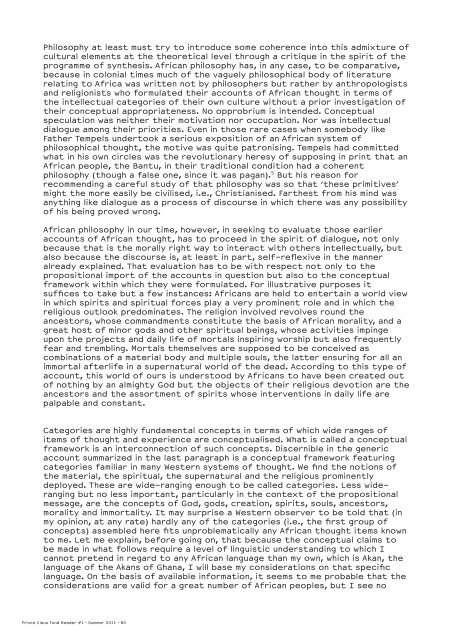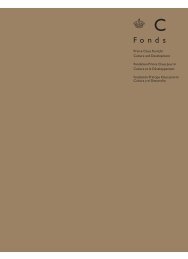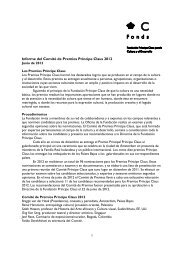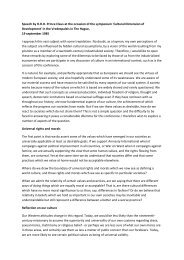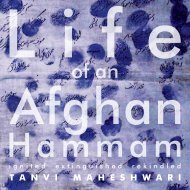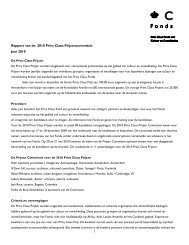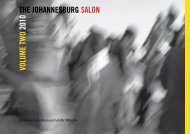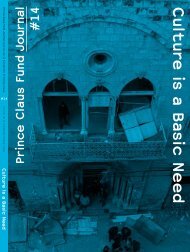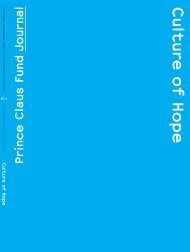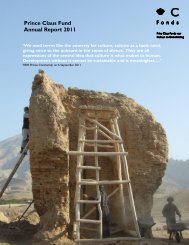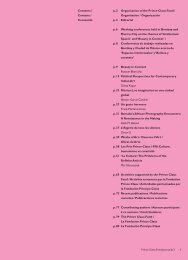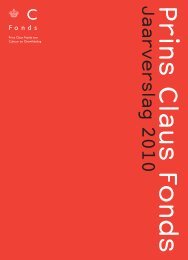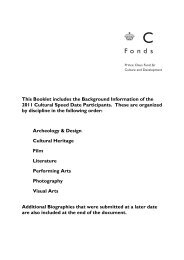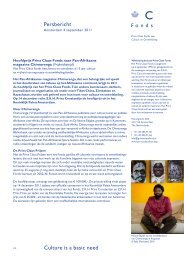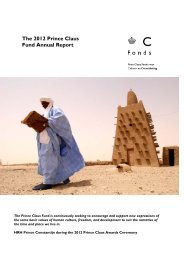3 summer 2011 - Prince Claus Fund
3 summer 2011 - Prince Claus Fund
3 summer 2011 - Prince Claus Fund
- No tags were found...
You also want an ePaper? Increase the reach of your titles
YUMPU automatically turns print PDFs into web optimized ePapers that Google loves.
Philosophy at least must try to introduce some coherence into this admixture ofcultural elements at the theoretical level through a critique in the spirit of theprogramme of synthesis. African philosophy has, in any case, to be comparative,because in colonial times much of the vaguely philosophical body of literaturerelating to Africa was written not by philosophers but rather by anthropologistsand religionists who formulated their accounts of African thought in terms ofthe intellectual categories of their own culture without a prior investigation oftheir conceptual appropriateness. No opprobrium is intended. Conceptualspeculation was neither their motivation nor occupation. Nor was intellectualdialogue among their priorities. Even in those rare cases when somebody likeFather Tempels undertook a serious exposition of an African system ofphilosophical thought, the motive was quite patronising. Tempels had committedwhat in his own circles was the revolutionary heresy of supposing in print that anAfrican people, the Bantu, in their traditional condition had a coherentphilosophy (though a false one, since it was pagan). 5 But his reason forrecommending a careful study of that philosophy was so that ‘these primitives’might the more easily be civilised, i.e., Christianised. Farthest from his mind wasanything like dialogue as a process of discourse in which there was any possibilityof his being proved wrong.African philosophy in our time, however, in seeking to evaluate those earlieraccounts of African thought, has to proceed in the spirit of dialogue, not onlybecause that is the morally right way to interact with others intellectually, butalso because the discourse is, at least in part, self-reflexive in the manneralready explained. That evaluation has to be with respect not only to thepropositional import of the accounts in question but also to the conceptualframework within which they were formulated. For illustrative purposes itsuffices to take but a few instances: Africans are held to entertain a world viewin which spirits and spiritual forces play a very prominent role and in which thereligious outlook predominates. The religion involved revolves round theancestors, whose commandments constitute the basis of African morality, and agreat host of minor gods and other spiritual beings, whose activities impingeupon the projects and daily life of mortals inspiring worship but also frequentlyfear and trembling. Mortals themselves are supposed to be conceived ascombinations of a material body and multiple souls, the latter ensuring for all animmortal afterlife in a supernatural world of the dead. According to this type ofaccount, this world of ours is understood by Africans to have been created outof nothing by an almighty God but the objects of their religious devotion are theancestors and the assortment of spirits whose interventions in daily life arepalpable and constant.Categories are highly fundamental concepts in terms of which wide ranges ofitems of thought and experience are conceptualised. What is called a conceptualframework is an interconnection of such concepts. Discernible in the genericaccount summarized in the last paragraph is a conceptual framework featuringcategories familiar in many Western systems of thought. We find the notions ofthe material, the spiritual, the supernatural and the religious prominentlydeployed. These are wide-ranging enough to be called categories. Less widerangingbut no less important, particularly in the context of the propositionalmessage, are the concepts of God, gods, creation, spirits, souls, ancestors,morality and immortality. It may surprise a Western observer to be told that (inmy opinion, at any rate) hardly any of the categories (i.e., the first group ofconcepts) assembled here fits unproblematically any African thought items knownto me. Let me explain, before going on, that because the conceptual claims tobe made in what follows require a level of linguistic understanding to which Icannot pretend in regard to any African language than my own, which is Akan, thelanguage of the Akans of Ghana, I will base my considerations on that specificlanguage. On the basis of available information, it seems to me probable that theconsiderations are valid for a great number of African peoples, but I see no<strong>Prince</strong> <strong>Claus</strong> <strong>Fund</strong> Reader #1 · Summer <strong>2011</strong> · 80


